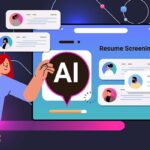Impact of Artificial Intelligence on Job Hunting
As artificial intelligence (AI) technologies continue to evolve, their influence on the job market, particularly for recent graduates, is becoming increasingly apparent. AI tools like ChatGPT excel in tasks traditionally performed by humans, raising questions about what this means for job seekers. Olivia Fair, a recent graduate, has found her job hunt particularly challenging over the past six months. “I’ve applied for probably over a hundred jobs, and none have yielded results,” she shared, reflecting a growing concern among her peers.
Fair’s experience highlights a significant shift in the workforce. Once a valuable role, transcribing interviews in TV production is now largely automated. “Now, they have maybe one person overseeing everything, with AI handling the bulk of the transcribing. This trend might be true for many entry-level positions,” she noted. While AI can be a helpful tool for professionals, it has resulted in a reduced demand for certain jobs.
Job Market Statistics
According to Laura Ullrich, the director of economic research at Indeed, a prominent job-listing website, job postings have dropped by 6.7% compared to the previous year. This decline has been particularly harsh on younger job seekers, including those who have recently graduated. When asked about the impact of rising AI technologies on job availability, Ullrich acknowledged a connection but indicated that other factors are also at play. “Job postings for tech positions are down 36% from pre-pandemic levels, though this decrease began before AI became widespread,” she explained.
Ullrich also pointed out that the post-COVID hiring boom saw many companies expand their workforce excessively. Now, the combination of economic uncertainties—such as tariffs and foreign policies—has caused some businesses to halt hiring. “It’s like driving in fog,” she said. “If the fog is thick, you proceed cautiously. When it’s very foggy, you might stop entirely.”
| Job Type | Risk of AI Replacement |
|---|---|
| Coding | High |
| Customer Service | High |
| Healthcare | Low |
| Teaching | Low |
| Graphic Design | Moderate |
Industry experts are actively discussing which jobs may be most vulnerable to AI advancements. A study analyzed 2,800 specific skills and found that about 30% of them could potentially be fulfilled, at least partially, by AI technology. Jobs that involve routine tasks performed on a computer are at the forefront, including coding, translation, and customer service.
On the flip side, roles that require empathy, innovative thinking, and physical presence are much less susceptible to automation. David Autor, a labor economist at MIT, emphasized that while certain occupations may disappear, the creation of new job categories is inevitable. “Many jobs today didn’t exist 50 or 100 years ago, like those in renewable energy and specialized medical fields,” he noted. Autor reassured job seekers that while job displacement will occur, advancements in various fields, including healthcare and sustainable energy, will emerge—potentially improving society overall.
Until those transitions occur, Ullrich encourages young job seekers to remain proactive. “The best advice I can give is to keep moving forward. Consider part-time jobs, internships, or leveraging your academic network to make connections,” she suggested.
As Fair contemplates her future in writing and production, she highlights the unique human aspects that AI cannot replicate, stating simply, “I’m a person, and not a robot.” The future remains uncertain, but efforts to navigate these evolving job landscapes are ongoing.






